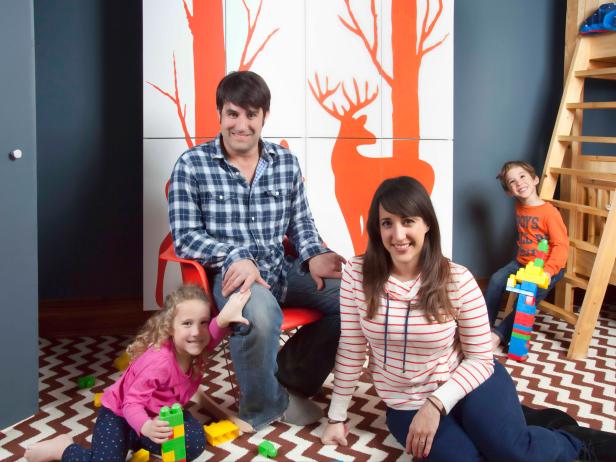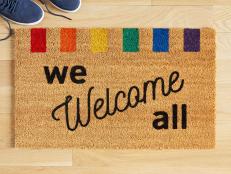No, I'm Not Leaving the City to Raise My Kids
Here's my answer to the often-asked question.

I'd lived in New York City for seven years by the time I had my twins. In that short time, I'd earned some pretty big "firsts" here: I'd gotten married, gotten pregnant and found a career. I'd formed enduring friendships and made a place for myself. I'd loved this city through September 11th and blackouts and subway strikes. Why would I leave when I had kids?

Photographer: Christina Wedge
I was more than a little surprised that the automatic question people asked me when they learned I was having twins was about when I was leaving. My dad still asks it 11 years later. It's such a given that you pack up and head to a three-bedroom in the 'burbs when you reproduce, that it's a cinematic cliché. I was watching a rerun of Friends recently and laughed knowingly as Ross told a 20-something Rachel that in his fantasy of their lives together, "We won't want to raise kids in the city, so we'll probably move to uh, Scarsdale." She immediately panics over the idea of one day needing to leave the city for this predetermined life.
I'm here to tell you it doesn't have to be your destiny! There are a slew of reasons parents like me are staying in their city once their kids are born, whether they themselves were born and raised there or not. People born in the city may not even question a move. They turned out just fine, and their kids will too, no doubt. It's the rest of us who were born outside of the city that tend to be the focus of The Question. Our families and friends want to know when our urban experiment will end with us heading back to "normal." Here's a non-exhaustive list of why I stayed:
It's My Home
I know that on the surface this may seem like a trivial reason, but it's not. NYC is my home more than any other place has ever been. I was born in Washington D.C. and lived in its suburbs, then up and down the East Coast, moving approximately once a year, when I was a kid. The high school I graduated from was the 10th school that I attended. I moved to Brooklyn 18 years ago and have lived within the same 1,000-foot radius since then. No doubt this stay-put-ness is a whiplash effect of my nomadic childhood, but I wanted my kids to be able to say that they were from one place. I've often marveled at people who have friends "from childhood." I wanted that for my kids and so far, they have it.
I love saying hi to our neighbors we see every day and store owners who remark on how big the kids have gotten since they were babies. We'll hear a quick two-beep honk from a passing car and we all raise our hands in a quick hello to our friends. It honestly feels a bit like we live on Sesame Street sometimes. If a parent is running late for school pick up, they ask me to grab their child for them and I do the same. My kids' heights are marked on our kitchen wall from the time they were old enough to stand still. This is the sort of thing you can only have if you have somewhere to call home. And for us, this is it.
This is Where Our Work Is
In the U.S., our cities tend to be the hub of the arts, and if you work in the arts—or in finance, sciences or a slew of other industries — this is where the work is. It's no small factor that we can only make a living in a handful of cities in the U.S. On the occasions that we've pondered leaving New York, we can only come up with a few other cities that would allow us to do what we do for a living. For us, there was no point in leaving the city we've called home for a different one.
The Hell That is the Commute
Tied really closely with the work factor is the commute factor. Of course, like Ross suggested, we could move to a suburb of New York, have a larger home and still get to work in our chosen professions. But do you know what the commute is like from the suburbs into the city? It's hell. Every time I've looked at real estate listings outside of the city and been enchanted by a gorgeous backyard, I've quickly checked my fantasy by doing a commute calculation. On average the commute clocks in at about an hour and a half in each direction for a house we could afford. That's three hours of my life every day that I would be on a train with strangers instead of with my family. Driving isn't a possibility. Have you seen traffic in Manhattan?

This is a big, giant nope.via gifer
In an emergency, I can get to my kids' school or the hospital—the one terrifying time that happened—fast. If I worked in the city and lived in the suburbs and an emergency popped up, I'd have to rely on someone else to be there for my children, and that's not a trade-off I'm willing to make. For the normal, non-emergency day, the time saved on a long commute is time that I get to make dinner and spend helping with homework or just watching a show with my kids.
Aside from the work commute, all the car time that is required when you're not in the city is a huge downside for me. If I'm making dinner and forgot an ingredient, I grab my keys and walk a block to the grocery store. In the mornings, we roll out of our apartment three minutes before the kids need to be at school because it's a half block away. If my out-of-the-city friends and families are to be believed, they spend approximately 75 percent of their lives in their cars. As much as I love a good drive, I don't love cars that much.
Small Spaces Mean We’re All in the Same Space
On my youngest niece's most recent trip with my sister to visit us in the city, she walked into our apartment, looked around and innocently asked, "This is it?" Yep, this is it. Two bedrooms, a nice-sized living room, a kitchen and a bathroom is all we've got. Frankly, by NYC standards, our 1,000 square feet verges on massive. But I get it! At my sister's house there are five bedrooms and a basement and a quantity of bathrooms that I dream about. There's an acre of backyard with a pool, and it's just so lovely and roomy. It's got a private space for everyone.
After years of living in close quarters, though, I can't help but feel a little lonely in big houses now. Do I sometimes wish for a quieter place for a phone call or yearn for a second bathroom? You bet! What I love even more than the comfort those sort of luxuries bring is physically being in the same space with my kids. If they're on the computer, it's right there on the couch sitting next to me so I can see what they're doing (as is my parental right). If I need a hand in the kitchen, I don't have to search the house for someone to help me out. If we're watching a movie, we're watching it together. We are close by default because we are with each other all the time, and I love that.
The City is Our Backyard
Even though the urban life is the one I've chosen, I am not a dyed-in-the-wool urbanite. I see the appeal of the country and understand why some people choose the suburbs. I definitely miss having an outdoor space that is mine and mine alone. Personally, I'd love to have a barbecue on my own patio. And when my kids were in the maniacal running-everywhere stage (like from ages two to eight), I desperately wished for a yard so that I could open my back door and shoo them out into it. When I was a kid with a backyard, though, I was often bored. If I was lucky, a neighbor would play with me, but if not, I was on my own. It wasn't the dream so many adults imagine it to be.
A change in perspective made me see the entire city as our backyard. Yes, we have to put on shoes, but we've got five different playgrounds just blocks away, a world-class museum a mile up the hill, and an Olmstead-designed park within a 15-minute walk. We've got beaches, rivers, urban farms, stoops and fire escapes. And if all of that isn't enough, we've got public transportation ready to take us anywhere we haven't yet explored, not to mention really easy access travel to anywhere in the world. The reasons we love this city are the same ones that tourists flock here every year (except for Times Square. New Yorkers avoid Times Square if they can).
Diversity, Plain and Simple
More than any of the other ones, the most important reason I chose to raise my kids in the city is the diversity it provides. As the child of one immigrant parent and one American-born one, I constantly heard another language spoken and ate "foreign" food at home. I loved being part of more than just one culture. I wanted my own kids to be surrounded by people who were different from them; people who looked different, who spoke different languages, who dressed differently, who ate different food and listened to different music. I love that we walk down the street and hear no fewer than five languages spoken on the way to the corner store. The kids in their school have parents who come from all over the world, which makes them very accepting of differences. They know that no matter where we come from, we’re all valuable; we're all fundamentally people.
So the very simple answer to the question about whether or not I'm leaving the city to raise my kids is this: No. No I'm not.

.-Battle-on-the-Beach-courtesy-of-HGTV.-.jpg.rend.hgtvcom.196.196.suffix/1714761529029.jpeg)












































